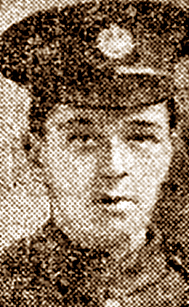The terrible sufferings of British prisoners of war, especially on their release from German camps, was described to the Luton News (December 12th, 1918) by a Lutonian who had shared them. Pte William Hardwick (47929, 2/8th Lancashire Fusiliers), of 33 Cowper Street, arrived home on December 1st, following his capture at Hargicourt in France on March 21st, 1918, the opening day of the German spring offensive that year.
His first experience when taken seemed to be an unfortunate augury of portending evil, said the newspaper. The party of which he was a member were marched five days continuously without any food whatever, and the first two days without water.
 They eventually arrived at Quesnoy and spent another uncomfortable time in cages without overcoats or anything like sufficient protection. They were next moved to Boheme, where 12 weeks were spent, and then to Hamel for three months.
They eventually arrived at Quesnoy and spent another uncomfortable time in cages without overcoats or anything like sufficient protection. They were next moved to Boheme, where 12 weeks were spent, and then to Hamel for three months.
The food was bad, comprising a small quantity of maize meal, horse beans, horseflesh and coffee. They were worked from 6am until ten at night, and some of the prisoners became so weak that they could hardly walk about.
As the British lines were advanced towards Hamel the camp was shifted to Valenciennes, where the prisoners were set to work on a railway, one of their occupations being digging holes round bridges ready for mines to blow them up should the British advance further.
This, of course, did happen and the party was again moved back – this time into Belgium. Mons and Namur were visited, and then they settled at Hepton on farm work.
After a fortnight there news of the signing of the armistice was received, and a change was noticed in the demeanour of their captors. They were not released, not told that they were free, but on November 12th they were left without food.
The party set out for Namur and, after many days of painful travel by foot, reached the British lines. They had no food on the way, except a little given by Belgian civilians, and, by the time they got to Calais, they were in rags and tatters, and with hardly any shoes to their feet.
However, new 'rig-outs' were supplied before crossing the Channel, and they were more comfortable on the homewards journey than they had been for many a long day.
Pte Hardwick was formerly employed by Messrs Read & Horn, Market Hill, and had been a member of the Union Chapel Sunday School.

